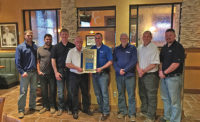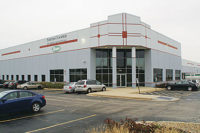St. Louis, Mo.-based Service Metal Vice President/Controller Tim Williamson gets right to the point when talking about the role of master distributors in the industry.
“Master distribution exists solely to the extent that it can add value to the supply chain,” he says. “Carrying a wide range of inventory that is readily available for shipment allows us to service the PVF market.”
And since the lower depths of the much-talked about recent recession, PHCP and PVF master distributors continue to thrive by providing a winning combination of both needed inventory and high levels of customer service.
“We are happy with the overall trend we are seeing,” says Corey Lowsky, vice president of sales for Massachusetts-based industrial PVF master distributor United Pipe & Steel. “We see more customers moving toward using master distribution as a resource. We push the model of buying less more frequently and that has intrigued and developed a customer base. Our customers are keeping inventories tight. They aren’t tying up cash in inventory and are using us and others as a just-in-time delivery system with our ability to combine items on the same purchase order, not to mention a trucking shortage in the U.S. is creating longer lead times from manufacturers. We’re seeing more and more customers come to master distribution as an option for their purchases.”
Kessler Sales & Distribution Vice President/General Manager Tim Hagan isn’t so sure the role of the master has changed much in recent times. “That’s not to say the value we deliver hasn’t shifted in lockstep with the economic climate,” he says. “In robust times, Kessler’s value has been to bring relief to an overtaxed supply chain. In lean times, our value has been to help wholesalers manage cash flow and mitigate risk by providing just-in-time replenishment service. Over the last 12-18 months our industry has seen incremental improvements in the marketplace. However, there has been a ‘choppiness’ to it where there have been a series of starts and stops that have been disruptive to building consistent momentum. In this type of environment, Kessler’s value is our ability to react and pivot quickly to meet the needs of the wholesalers.”
Ranson Roussel, president and CEO of The Distribution Point, a master distributor of many well-known bath and kitchen brands, is a subscriber to the importance of being able to adapt quickly to changing market conditions, especially in light of a recent manufacturing trend he’s noticed.
“We have seen more manufacturers in our space, namely branded faucets and fixtures, move toward lowering freight minimums and shipping substantially smaller orders, sometimes a piece at a time,” he says. “Doing so is a break in the process for most manufacturers, and as a result service is inconsistent. When our customers order from us, they get consistent rock-solid performance.”
Planning ahead
Master distributors continue to make advancements within their companies that will ensure they continue to thrive in an ultra-competitive marketplace.
Within the last year, United Pipe & Steel opened a new distribution center in the central Florida area — its 10th DC (five new DCs in the last five years). Merit Brass, an industrial PVF manufacturer and master distributor, recently expanded its Cleveland headquarters and is actively preparing for an ERP implementation scheduled to go live in October.
Houston-based Team Alloys, which saw a 40% growth in business in 2014 according to owner Bill Bootz, is in the site-procurement stages for a new 200,000-sq.-ft. facility and also recently launched its own ERP software (Software 4 U) that it is marketing to companies in the distribution industry. Kitchen, bath and lighting master The Stock Market is taking advantage of a new national sales center that has capacity for almost 400 customer-service reps.
Behind the scenes, Kessler has taken a different approach with its sales strategy, moving from a centralized sales team to a decentralized one. “Our territory account managers work from home offices in regions they sell into. They work the phones 75% of time and are out on the road meeting with customers the other 25%,” Hagan says.
Hagan adds in places where the wholesale population is more dense, Kessler has switched to full-time business-development managers who are Kessler direct employees and are on the road 100% of the time (teamed up with an inside sales counterpart). “This strategy has helped us build more meaningful relationships with our customers because our sales team has a much greater understanding of our wholesalers’ opportunities and challenges,” he says.
And in the case of Service Metal, it set up a Houston area location right in the middle of the action. Williamson says the company has found enormous growth potential from the Permian Basin all the way along the Gulf Coast since opening almost two years ago.
“Houston is an important market in our industry,” he says. “It’s exciting seeing so many new customers getting the benefits from our unique business model. But, we have found our three branches in St. Louis, Charlotte and Houston give us very good coverage to service new and existing customers. We can ship to much of the U.S. in one or two days and all three branches often can turn around even larger orders for same-day shipments, which puts contractors to work across the country.”
What does the future look like?
Steve Saunders, sales manager at The Stock Market, sees technology playing a vital role in the continued viability of the master. “To remain relevant as a master distributor, we must stay in step with technology by offering up-to-date resources such as online ordering, real-time product availability, along with accurate on-time shipping and delivery, immediate order confirmation, tracking and world-class customer service. We must be easy to do business with at every customer touch point.”
Uncertainty with the level of economic recovery is something Merit Brass Corporate Product & Sales Manager Steve Evans sees as still weighing on distributors’ minds. “Despite a very healthy rebound in sales volume since the rock-bottom conditions of 2009, there still remains that uncertainty and wholesalers, in many cases, will continue their reliance on master distribution to help minimize their inventory exposure and allow them to invest in technology, people and infrastructure they might otherwise not be able to.”
Bootz, who has noticed an uptick in consolidation in the master space in recent times, says sustained success in the master distribution arena ultimately boils down one key factor — service.
“To make it work you have to provide value to the customer with the right products, competitive prices and great service,” he says. “And you have to care about what you are doing. What’s going to last in this business is providing great service to your customers.”
HELPFUL LINKS:







